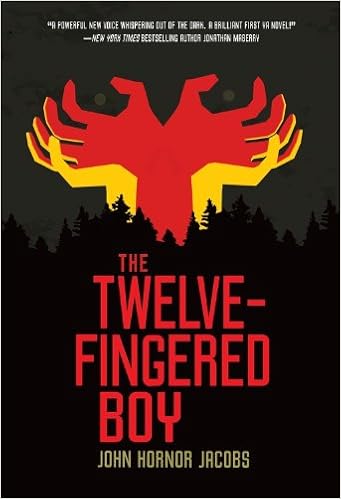This week's Writing Wednesday is The Twelve-Fingered Boy by John Hornor Jacobs.
This book can be easily classified as a superhero book. It is, after all, about people with powers in the modern world. But it lacks a number of the elements that really define the superhero genre. There are no costumes or capes. There is no fight for truth and justice. And there is no clear victory with a simple morality. This might be better classified as horror, and shelved right next to Carrie and Firestarter.
The plot is actually surprisingly simple. Shreve is a slick salesman of a teenage delinquent, doing his time in juvie. He gets a new roomie, Jack, who turns out to have six fingers on each hand (hence the name of the book) and poorly controlled superpowers. Adults representing a shadowy organization appear to try and take Jack away. Shreve surprises everyone and mostly himself by stepping up to protect his new roomie. They escape, constantly fleeing their new nemesis Quincrux. The third act forces the boys to make a difficult choice: in order to save an innocent victim they would have to reveal their position and risk their freedom.
What makes this book interesting is the detail, both told and untold. There are the obvious questions about the set-up (why is Jack in juvie?) and world-building (what the heck is in Maryland?). But importantly, this is also a coming-of-age tale for Shreve. He is shucking off the baggage of a very difficult childhood and deciding what kind of man he wants to be. He wants to take care of Jack, but is that because he cares for Jack, or because Jack is a surrogate for the little brother he lost when he went into juvie? Is he the selfish bastard his mother says he is, or is he the hero that Jack thinks he can be?
I have to say that I enjoyed this book more than I expected. I don't typically like tales that are described in terms like "gritty" and "streetwise". That's not a world I understand, and it's not a world I want to understand. I like my heroes to be good guys, plain and simple. That's certainly not what we have here. I nearly put the book down a third of the way through, but the world-building strung me along just a little bit longer. And I am so glad it did. Once Shreve starts opening up, not just to the other characters but to the readers ourselves, the book takes on a different tone. The second act is all about shades of gray and trying to tell the difference between necessary evil and convenient evil. It's very compelling.
I was very pleased with the way the book ended. Jacobs managed to tie things off in a way that Shreve got an excellent and satisfactory arc, but the story is still clearly set up for the rest of the trilogy. I'm definitely going to be purchasing the next two books.
One thing that I did find interesting was a number of questions this book raised about race. And specifically because it didn't raise questions of race. But out of the gate, I assumed that Shreve, Jack, and the assistant warden Booth were all black. Why? I honestly have no idea. Because there were a number of descriptions later on that indicated that they were actually white. Did I assume they were black because they were criminals? Because they were poor? Because they were clearly uneducated? I really don't know. And that bothers me.
Earlier I mentioned Carrie and Firestarter. I would feel very comfortable in putting this book into the same class. If you enjoyed those books (and particularly the books rather than the movies), then I would recommend you read The Twelve-Fingered Boy. But if you are looking for a superpowered Harry Potter, you definitely need to look elsewhere.

No comments:
Post a Comment